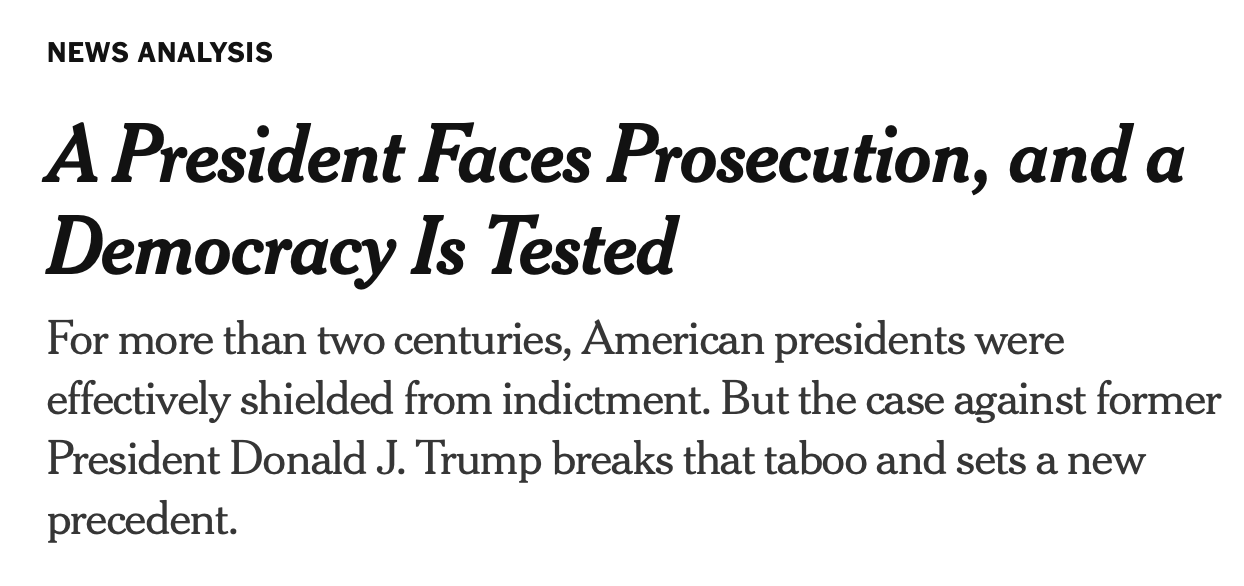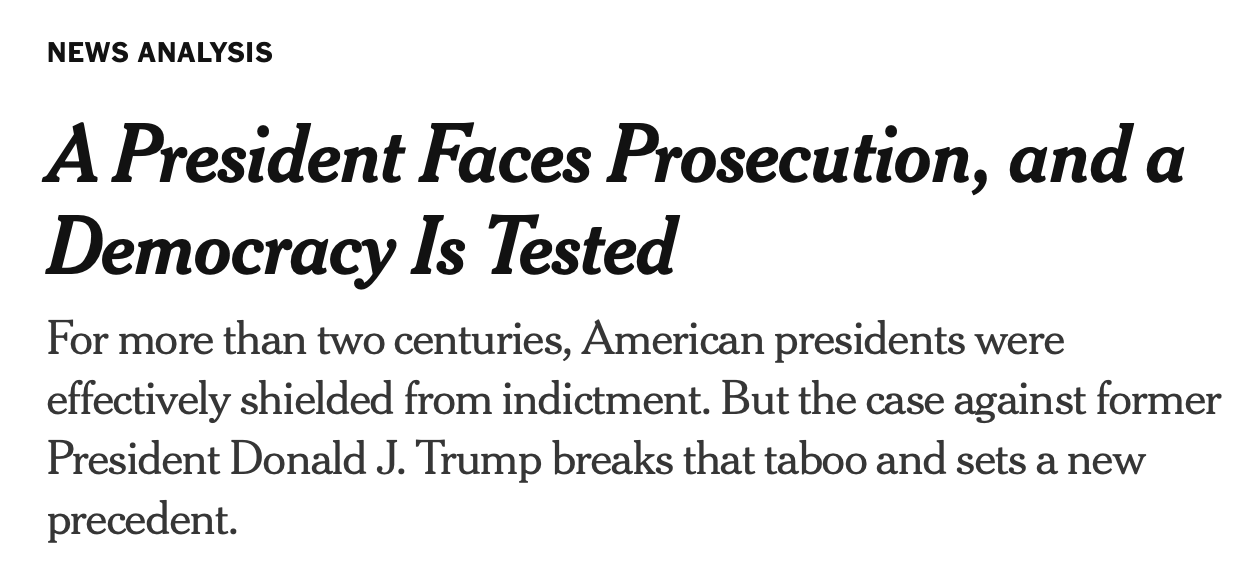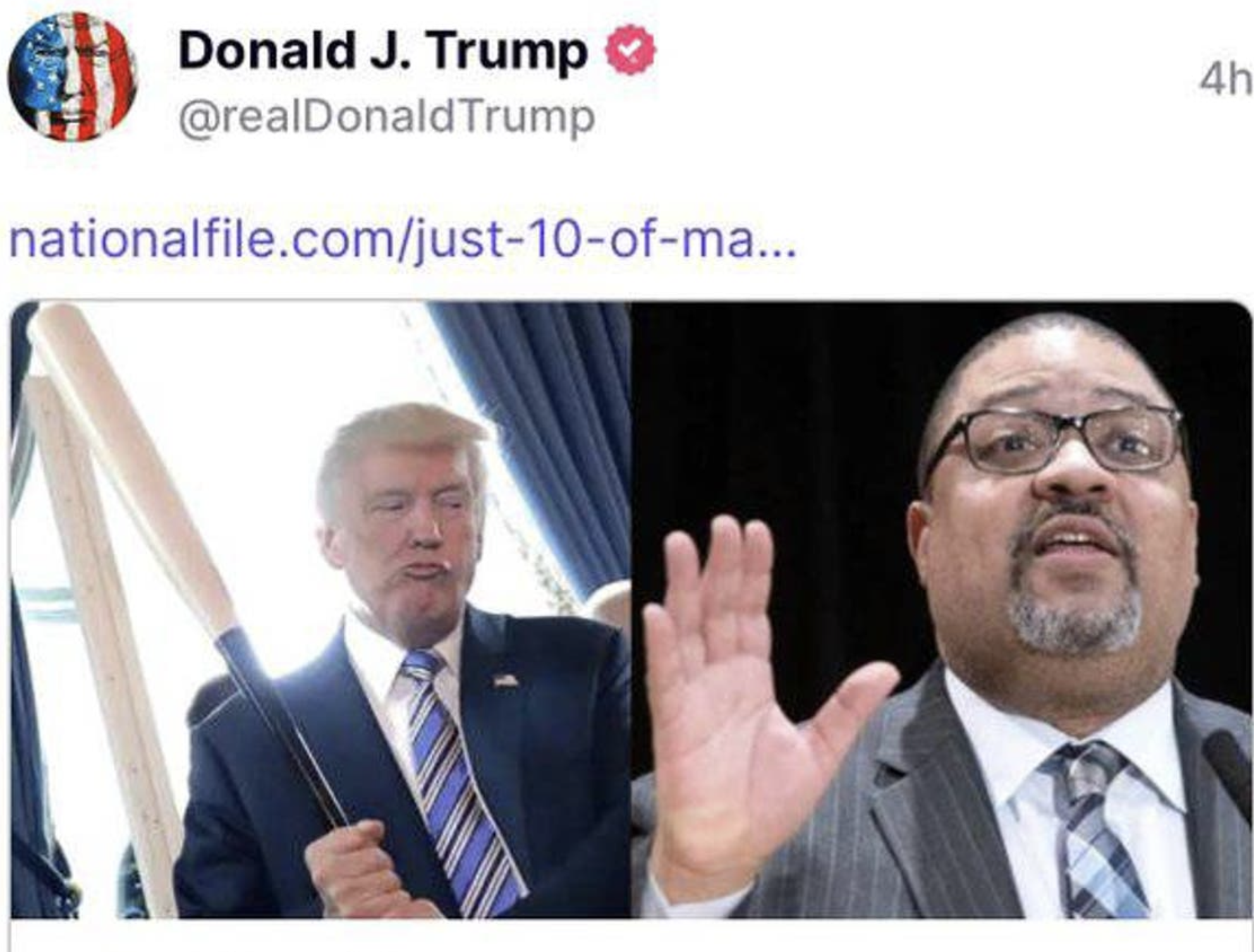The New York Times is trying to legitimize Republican retaliation for the Trump indictment. Don't fall for it.

The New York Times “news analysis” of Donald Trump’s indictment, by chief White House correspondent Peter Baker, is an absolute mess of contradictions and unsupported assertions that add up to an attempted delegitimization of the Trump indictment and preemptive justification for unjustifiable Republican retaliation.
The Times leads with the characterization of the indictment as having broken a “taboo”:
For more than two centuries, presidents have been held on a pedestal, even the ones swathed in scandal, declared immune from prosecution while in office and, effectively, even afterward.
No longer. That taboo has been broken.
Note that Baker conflates a previous lack of post-presidential prosecutions with post-presidential immunity from prosecution. These are very much not the same thing! Yet the entire premise depends on pretending that they are, and so the Times does so.
Anyway, it’s nonsense. Indeed, nine paragraphs into the “analysis” the Times acknowledges “the framers explicitly contemplated the prospect of [presidents] being charged after leaving office.” In paragraph 10, the Times acknowledges the Constitution explicitly makes clear that former presidents can be prosecuted. In paragraph 13, the Times concedes that Mitch McConnell explicitly said Donald Trump would be subject to criminal prosecution upon leaving office:
Indeed, while voting to acquit Mr. Trump at his second impeachment trial — the one charging him with inciting the Jan. 6, 2021, attack on the Capitol — Senator Mitch McConnell, the Republican leader from Kentucky, said he did so because Mr. Trump was no longer in office but added that he was still subject to criminal prosecution.
So given that basically everybody — from the framers of the constitution to Mitch McConnell — understands that former presidents can be prosecuted,1 why are Baker and the Times pretending that the Trump indictment “breaks a taboo” and is inconsistent with some made-up “effective immunity”?
Why, so they can justify potential Republican retaliation, of course:
In 2008, voters in two small towns in liberal Vermont approved resolutions accusing Mr. Bush and Vice President Dick Cheney of “crimes against the Constitution” and instructing their town attorneys to draft indictments. Nothing ever came of it, but it is not hard to imagine a conservative local prosecutor trying to charge President Biden with, say, failing to adequately guard the border.
“This presents the opportunity for potentially thousands of state and local prosecutors to investigate and charge a president without the impediment imposed by D.O.J.’s policy against indicting sitting presidents,” said Stanley M. Brand, a former House counsel whose firm represents a couple of Trump associates in the investigation into the mishandling of classified documents. “It theoretically subjugates the presidency in a way I don’t believe was ever constitutionally contemplated.” [emphasis added]
It may not be “hard to imagine” a conservative local prosecutor indicting a sitting President Biden over a policy dispute, but such an action would be in no way analogous to Trump’s indictment, or justified by it. Note that the “D.O.J.’s policy against indicting sitting presidents” is completely irrelevant here. Donald Trump — as you may have noticed to your great relief — is not a sitting president. Therefore his indictment in no way undermines any policy against indicting sitting presidents2 and the presidency is not “subjugated” in any way. And, as we have already established, the constitution not only contemplates the prosecution of former presidents, it explicitly provides for it. In short, this passage is nothing but sleight-of-hand by the Times, both in its own voice and in the lawyer for Trump associates it chooses to quote. It is important to note that the Times decided include (either its own voice, or by quoting someone else) the essential fact that the potential Republican retaliation it touts would not actually be analogous to or justified by the Trump indictment.

The Times is right about one thing: Our democracy is being tested. By many things — not least the Times own deeply flawed and irresponsible coverage. Cheerleading for baseless Republican efforts to misuse to prosecute Democrats over policy disputes — and portraying those efforts as justified by the Trump indictment — is precisely the kind of thing that does grave damage to our democracy. Not to mention the fact that falsely portraying the Trump indictment as a taboo-shattering violation of Trump's “effective immunity”3 can only aide his efforts to incite violence in response to the indictment.

Trump’s indictment does not come as a shock. The New York Times has had plenty of time to prepare for it. And this is what it came up with. Shameful.
Member discussion